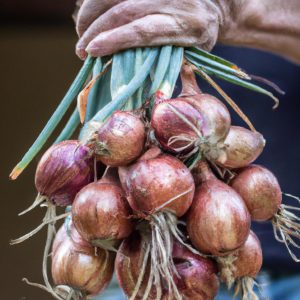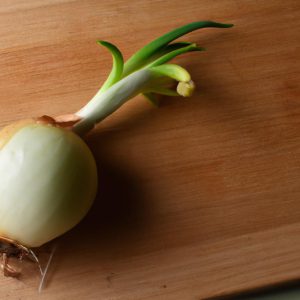If you’re a fan of onions, you might have been concerned by rumors that onions are nightshades. But is there any truth to this claim? The answer is no. Onions are not nightshades, and it’s important to understand the difference between the two.
Nightshades are a family of plants that includes potatoes, tomatoes, and peppers. They get their name from the fact that some of them are known to be toxic and can cause hallucinations, confusion, and even death. This has led to a common misconception that onions are also nightshades, but this is not the case.
Understanding the difference between nightshades and non-nightshades is essential for making informed dietary choices. In this article, I’ll explain what nightshades are, what non-nightshades are, and why it’s important to know the difference. I’ll also debunk the myth that onions are nightshades and provide you with accurate information about the nutritional benefits of onions. So, let’s get started!
What are Nightshades?

Nightshades are a family of plants that belong to the Solanaceae family. They are characterized by their alkaloid content, which can be toxic in high doses. Some nightshades, such as belladonna, are known to be poisonous and can cause hallucinations, confusion, and even death. However, many nightshades are perfectly safe to eat in moderation.
Definition of Nightshades
Nightshades are plants that belong to the Solanaceae family. They are characterized by their alkaloid content, which can be toxic in high doses. The alkaloids found in nightshades, such as solanine and nicotine, are designed to protect the plants from insects and other predators.
Examples of Common Nightshade Plants and Vegetables
Some common nightshade plants and vegetables include:
- Potatoes
- Tomatoes
- Eggplant
- Peppers (bell, chili, and paprika)
- Tomatillos
- Goji berries
- Tobacco
While some people may have adverse reactions to nightshades, such as joint pain or digestive issues, the vast majority of people can consume them without any problems. However, if you have a known sensitivity to nightshades or are experiencing symptoms after consuming them, it’s best to consult with a healthcare professional.
What are Non-Nightshades?

Nightshades are just one group of plants, and there are many other non-nightshade plants and vegetables that you can enjoy. Non-nightshades are plants that do not belong to the nightshade family, and they have their own distinct characteristics.
Non-nightshades are generally low in alkaloids, which are the compounds found in nightshades that can be toxic in high doses. This makes them a great alternative for people who are sensitive to nightshades or are looking to reduce their intake of alkaloids.
Some common non-nightshade plants and vegetables include:
Leafy Greens
Leafy greens are packed with nutrients and are a great addition to any diet. They are also a good source of fiber, which can help to keep you feeling full and satisfied. Some examples of leafy greens include spinach, kale, and lettuce.
Cruciferous Vegetables
Cruciferous vegetables are a group of vegetables that are known for their anti-inflammatory and anti-cancer properties. They are also high in fiber and low in calories, making them a great choice for weight loss. Some examples of cruciferous vegetables include broccoli, cauliflower, and cabbage.
Root Vegetables
Root vegetables are a great source of carbohydrates and provide a lot of energy. They are also high in fiber and contain a range of vitamins and minerals. Some examples of root vegetables include carrots, beets, and sweet potatoes.
Allium Vegetables
Allium vegetables are a family of vegetables that includes onions, garlic, and leeks. They are known for their strong flavors and are used in a wide range of cuisines. Allium vegetables are also high in antioxidants and have anti-inflammatory properties.
In summary, non-nightshade plants and vegetables are a great alternative to nightshades and offer a range of health benefits. Incorporating a variety of non-nightshade vegetables into your diet can help to ensure that you are getting all the nutrients you need for optimal health.
The Truth About Onions

Explanation of the Difference Between Onions and Nightshades
While nightshades and onions may look similar, they are not related in any way. Nightshades belong to the Solanaceae family, while onions are part of the Allium family. The confusion between the two may arise because both have a similar structure and are used in cooking. However, this is where the similarities end.
Onions are bulbs that grow underground and are known for their pungent flavor and aroma. They are a staple in many cuisines and are used in a variety of dishes, from soups and stews to salads and sandwiches. Onions are also packed with nutrients, making them a healthy addition to any diet.
Nutritional Benefits of Onions
Onions are low in calories but rich in essential nutrients, making them an excellent choice for those looking to maintain a healthy diet. They are an excellent source of vitamin C, which supports the immune system and helps the body absorb iron. Onions also contain fiber, which helps keep the digestive system healthy and can reduce the risk of chronic diseases.
Onions are also rich in antioxidants, including flavonoids and sulfur compounds, which have been linked to a reduced risk of cancer and heart disease. These compounds also have anti-inflammatory properties, which can help reduce inflammation in the body.
Misinformation Surrounding Onions and Nightshades
Despite the fact that onions are not nightshades, there is still a lot of misinformation surrounding the two. Some people believe that onions can cause the same health issues as nightshades, such as inflammation and joint pain. However, there is no scientific evidence to support this claim.
In fact, onions have been shown to have anti-inflammatory properties and may actually help reduce inflammation in the body. While some people may be sensitive to onions and experience digestive issues after consuming them, this is not the same as an allergic reaction and does not mean that onions are harmful.
Overall, onions are a nutritious and delicious addition to any diet. They are not nightshades, and there is no evidence to suggest that they are harmful to your health. So go ahead and enjoy your onions!
Health Concerns and Nightshades
Nightshades have been the subject of much debate in the health community, with some people claiming that they can cause a variety of health problems. However, there is currently no scientific evidence to support these claims. Let’s take a closer look at the potential health issues related to consuming nightshades, the scientific studies on their impact, and how they compare to non-nightshades.
Potential Health Issues
One of the main concerns about nightshades is that they contain alkaloids, which can be toxic in large amounts. Some people believe that these alkaloids can cause inflammation and aggravate conditions such as arthritis and autoimmune disorders. However, there is no clear evidence to support this theory.
Another concern is that nightshades contain solanine, which can cause digestive issues, headaches, and other symptoms in some people. However, solanine is only present in small amounts in nightshades, and most people are able to tolerate it without any problems.
Scientific Studies
Despite the claims about the potential health issues related to nightshades, there is currently no scientific evidence to support these theories. In fact, some studies have suggested that nightshades may actually have health benefits. For example, tomatoes are rich in lycopene, which has been linked to a reduced risk of cancer, heart disease, and other health problems.
Comparison to Non-Nightshades
When it comes to the potential health benefits and risks of nightshades versus non-nightshades, the picture is compleWhile some nightshades may have potential health benefits, such as the lycopene in tomatoes, others may have potential health risks, such as the alkaloids in potatoes. However, it’s important to remember that these risks and benefits are generally quite small, and most people are able to consume nightshades and non-nightshades without any problems.
Overall, while there is some concern about the potential health risks of nightshades, there is currently no clear evidence to support these claims. If you enjoy eating nightshades, there is no reason to avoid them unless you have a specific allergy or intolerance. As with all foods, moderation is key, and a balanced diet that includes a variety of fruits and vegetables is the best way to ensure optimal health.
Conclusion
In conclusion, onions are not nightshades. This common misconception has led to confusion and misinformation about the nutritional benefits and potential health risks of these two types of plants. It’s essential to understand the difference between nightshades and non-nightshades for making informed dietary choices.
By debunking this myth, we’ve highlighted the importance of accurate information and the potential health benefits of onions. With their high antioxidant and anti-inflammatory properties, onions are a great addition to any diet.
At onionfacts.com, we pride ourselves on providing accurate and trustworthy information about onions and other vegetables. We hope that this article has helped clarify any confusion about whether onions are nightshades and has provided you with valuable information about the nutritional benefits of onions.
Remember to always seek advice from a medical professional before making any significant changes to your diet. Thank you for reading, and we hope you continue to enjoy the many health benefits of onions!







